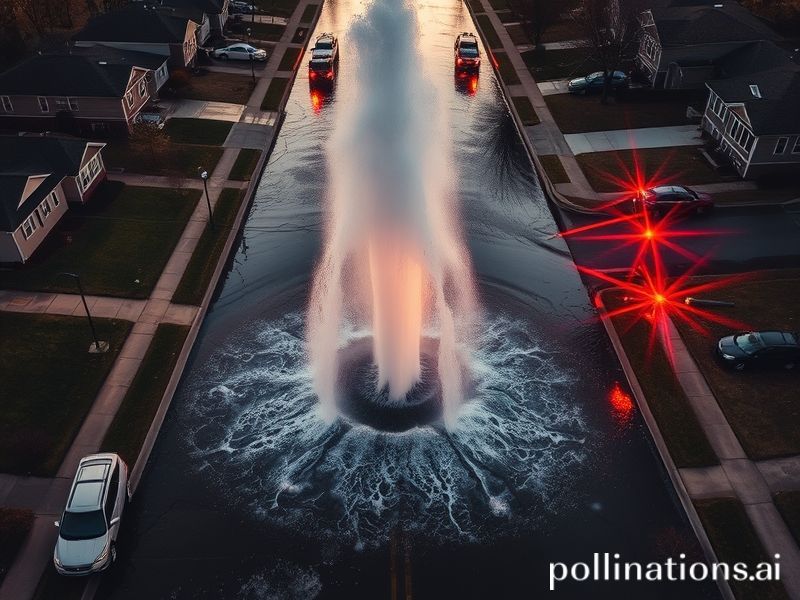Geyser in Suburbia: How One Michigan Water Main Became a Global Wake-Up Call
Novi, Michigan—population 66,000, median income “comfortably suburban,” and, as of 3:47 a.m. Tuesday, proud owner of a brand-new 40-foot geyser where Main Street used to be. The water-main rupture sent a plume high enough to register on regional Doppler, soaked two Starbucks, and briefly convinced the local Nextdoor network that North Korea had finally overreached. By dawn, the torrent had subsided into an ankle-deep reflecting pool perfect for Instagramming your dystopia. International significance? Absolutely. Because if a mid-tier American suburb can’t keep its pipes from impersonating Old Faithful, what hope has the rest of the planet when the real crisis arrives?
Consider London, where Thames Water leaks 600 million liters daily—roughly one Olympic pool every ninety minutes—while executives collect bonuses and politely ask citizens to bathe less. Or Cape Town, which nearly became the first major city to run dry, prompting a civic countdown to “Day Zero” that felt like Y2K with actual thirst. Tokyo, ever the overachiever, has reduced leakage to 3 % through a squad of ninja-suited night inspectors who literally crawl through tunnels listening for drips. Meanwhile, Novi’s solution Tuesday morning was a single backhoe and three guys debating whose union card required the coffee run.
The global water sector, valued at $900 billion and climbing faster than crypto in a bull run, loves to tout smart meters and AI-driven valves. Yet the humble water main—essentially a cast-iron straw laid during the Eisenhower administration—remains the industry’s unloved stepchild. Consultants in Dubai will happily sell you a desalination plant with mood lighting; nobody holds press conferences about replacing the pipe that feeds it. The American Society of Civil Engineers grades U.S. drinking-water infrastructure a C-minus, the academic equivalent of “shows up, rarely showers.” Last year alone, the U.S. suffered an estimated 240,000 main breaks—one every two minutes—costing taxpayers enough to buy Denmark outright, Lego included.
Overseas investors watch Novi-style geysers with the detached curiosity of art collectors eyeing a newly discovered Basquiat. Singapore’s sovereign wealth fund has quietly acquired stakes in midwestern utilities, wagering that climate stress plus deferred maintenance equals dependable dividends. German reinsurers, still haunted by 2021’s Ahrtal floods, now price “water infrastructure failure” as an emerging risk alongside cyber-attacks and political coups. Even China’s Belt & Road Initiative has pivoted, offering to rebuild Beirut’s water grid for the low, low price of a 40-year concession and whatever data leaks out in the process.
Back in Novi, residents queued for bottled water like extras in a disaster film where the budget couldn’t afford zombies. City officials promised a “full forensic audit,” which in municipal speak translates to “we’ll mail you a PDF.” The break, blamed on a 1960s-vintage pipe and this winter’s charming freeze-thaw whiplash, shut down eight schools and turned rush hour into a jetski course. Local radio urged calm, then played “Under the Sea” on loop—proof that even crisis management can’t resist a cheap gag.
And yet, the geyser is more than municipal slapstick; it’s a preview trailer for the 2030s. As glaciers sulk and aquifers dip, every ruptured main is a reminder that civilization runs on plumbing we’d rather not finance. The World Bank estimates $6.7 trillion must be sunk into global water systems by 2050 to avoid “reverse development,” a euphemism for cholera chic. Until then, places like Novi will keep supplying object lessons in hydraulic hubris, one spectacular fountain at a time.
So raise a plastic bottle—sourced, ironically, from the same aquifer bleeding out under Main Street—to the humble water main. It may not be as sexy as a fighter jet or as meme-able as a crypto crash, but it’s the thin, rusty line between modern life and medieval inconvenience. And when it blows, the whole world gets a little wetter, a little poorer, and, if you squint, a little wiser. But mostly wetter.







